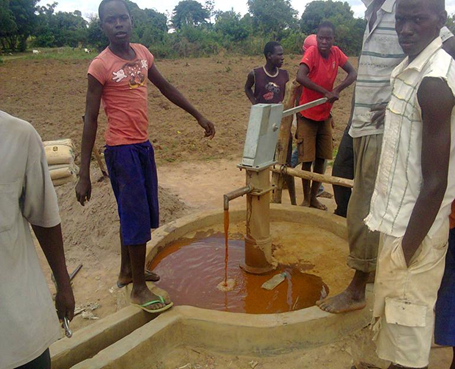Blog post written by the International Coordinator of End Water Poverty, Al-hassan Adam in February 2016.
Handpumps/ boreholes (see picture below) have become the ideal tool for the provision of water to rural communities and sometimes to unserved urban communities. According to Jess MacAthur in “Handpump Standardisation in Sub-Saharan Africa: Seeking a champion” about 66,000 hand-pumps are installed in Sub Sahara Africa annually, and over 1 million boreholes installed so far. These boreholes bring smiles to the faces of millions of people in rural Africa. A lot of pomp and pageantry goes with the commissioning of this life saving facilities. The joy and life which the borehole brings to some communities is rather short lived. It is estimated that on a given day, about 30% of handpumps breakdown. To make the situation even grim, some of the functioning Boreholes produce water not fit for consumption. The water pumped out water is brownish looking liquid with a heavy smell of rust. The villagers sometimes refer to it as blood water. This happens when cheap pumps parts made out of galvanised metals are installed in wells where the groundwater has a pH of less than 7.
I was shocked to hear that in 1980s, World Bank and UNDP raised issues about the suitability of using galvanised metal parts for groundwater with less than pH 7 levels which is one of the contributing factors of rust. It is a scandal for NGOs, donors and governments in Africa allow this to continue for 30 good years and it is still happening.

Photo source: Rural Water Supply Network
Donors’ insistence of value for money at installation stage is a major contributor to this scandal instead of focusing on life cycle cost (Dr Peter Harvey, UNICEF). The value of a project should be judged through its full programme cycle. Drilling companies playing cutting corners are also part of the problem. For starters I will recommend a video by Rural Water Supply Network titled “Overcoming the Rural Water Supply Scandal of Handpump Corrosion”. It is brilliant video, it exposes corrupt nature and lack of willingness to change by some drilling companies. Some companies even falsify pH values for wells by diluting its water with bottled water.
After years of advocacy by groups such as RWSN and its partners, some actors are now taking action, but late than never. In Uganda, Wateraid has started listening to the communities by replacing the pump components which are susceptible to rust. Ugandan government took a further step to create the Infrastructure Operation and Maintenance unit under its Rural Water Supply and Sanitation Department.
What could be done?
Donors and NGOs who have installed such pumps should be humble enough to go back and change the rust prone galvanised steel parts. They should apologise to the communities for delivering botched work. There should be global zero tolerance to galvanise steel parts in borehole mechanisms. National governments should stop companies and NGO from operating if they continue installing these pumps should be stopped in operating.
Rural communities deserve better treatment from service providers, especially when we claim to stand for equity, fairness and development. This is development is problematic when considering that all nations have signed on to the human rights to water and sanitation which recommends services provision should take into consideration of quality and acceptability.
In the coming month, EWP through its Water Action Month would be mobilising its members to hold service providers and duty bearers accountable. There are a number of ways you can take action and we have developed resources which you can adopt to meet your action.